Peptide Analysis Service
Peptide Analysis is the systematic examination of peptides to determine their sequences, structures, modifications, and biological functions. This process plays a crucial role in understanding the fundamental properties of peptides derived from biological systems, enabling insights into their interactions, regulatory mechanisms, and roles in various physiological processes. Utilizing advanced techniques such as mass spectrometry, peptide analysis provides comprehensive data on peptide profiles within complex samples. The peptide analysis begins with sampling from various biological sources, followed by size-based filtration to isolate peptides under 10 kDa. Enrichment and clean-up steps are then performed to target specific peptide types such as protein-derived peptides, peptide hormones, antimicrobial peptides, and neuropeptides. Chemical derivatization is used to linearize peptides, ensuring consistency for downstream analysis. Finally, advanced techniques such as separation, mass spectrometry, and data annotation are applied for comprehensive peptide characterization.
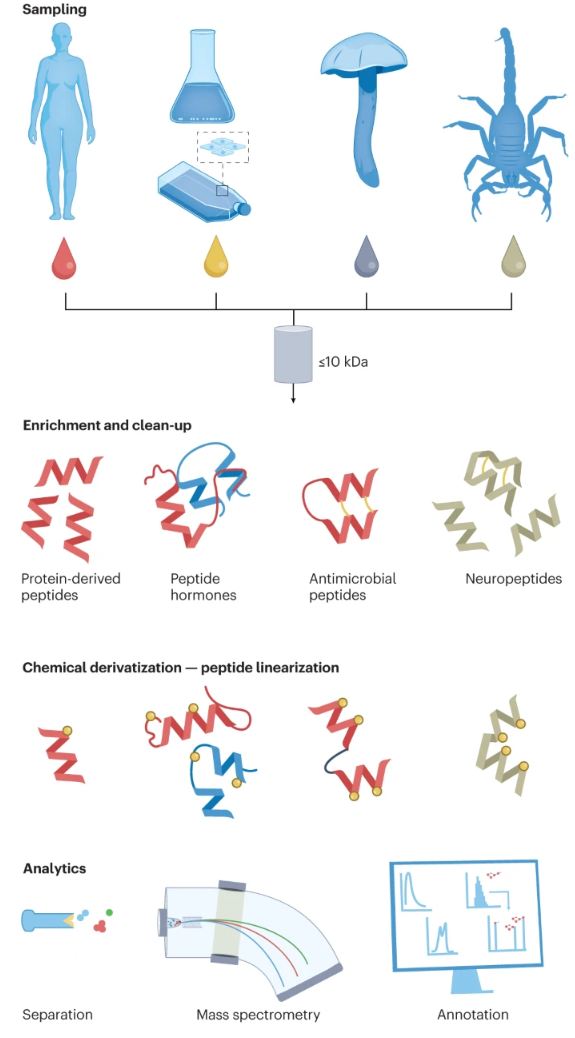
Hellinger, R. et al. Nat Rev Methods Primers. 2023.
Figure 1. The Workflow of Peptide Analysis
Peptide Analysis is essential for addressing challenges in biomedical and biochemical research. It helps identify bioactive peptides, discover potential biomarkers, and characterize post-translational modifications, which are critical for understanding disease mechanisms and developing therapeutic solutions. Additionally, it supports applications in drug development, food science, and plant biology by revealing peptide functions and their contributions to diverse biological activities.
Services at MtoZ Biolabs
MtoZ Biolabs, an integrated chromatography and mass spectrometry (MS) services provider, provides advanced proteomics, metabolomics, and biopharmaceutical analysis services to researchers in biochemistry, biotechnology, and biopharmaceutical fields. MtoZ Biolabs provides efficient and precise peptide analysis service by leveraging state-of-the-art mass spectrometry platforms and a highly skilled technical team dedicated to maintaining the highest standards at every stage of the process. Our laboratory is equipped with cutting-edge instruments, including high-resolution liquid chromatography-mass spectrometry and automated sample preparation systems, capable of detecting and analyzing complex peptide information with exceptional accuracy. Backed by extensive project experience and expertise, our team is proficient in analyzing various peptide types, from sample preparation and peptide enrichment to precise identification of post-translational modifications, delivering scientifically reliable solutions. MtoZ Biolabs is committed to providing full-process support from sample handling to data analysis ensuring efficiency and accuracy, making it the ideal partner for advancing your research projects.
Service Advantages
1. Comprehensive Peptide Characterization: MtoZ Biolabs' peptide analysis service utilizes advanced mass spectrometry technology to efficiently detect a wide range of peptides in complex samples, enabling comprehensive peptidomics analysis and providing valuable biological insights for research.
2. Advanced Technology Platform and Data Processing Capabilities: Our peptide analysis service integrates state-of-the-art mass spectrometry and data processing techniques, supporting highly sensitive quantitative analysis while optimizing separation technology to enhance detection efficiency and result accuracy.
3. Customized Solutions: Tailored to diverse research needs, MtoZ Biolabs offers customized peptide analysis servicethat provides researchers with professional and precise tools for their studies.
Case Study
1. Identification and Detection of a Peptide Biomarker and Its Enantiomer by Nanopore
This study presents a novel approach for identifying and detecting peptide enantiomers using aerolysin nanopores combined with electrical detection. It focuses on the enantiomers of vasopressin (L-AVP and D-AVP), which have identical mass and charge but distinct biological activities due to their unique conformations. The study demonstrates the ability to distinguish these enantiomers in both native and reducing conditions by analyzing their specific electrical signatures. Principal component analysis was employed to refine the identification process, while Monte Carlo prediction enabled precise assignment of events to specific enantiomers, paving the way for advanced enantiomer detection techniques. Peptide analysis service utilizes cutting-edge nanopore technology to differentiate peptide enantiomers. It supports precise identification under diverse conditions and leverages advanced data analysis techniques for enhanced accuracy and reliability in peptide characterization.
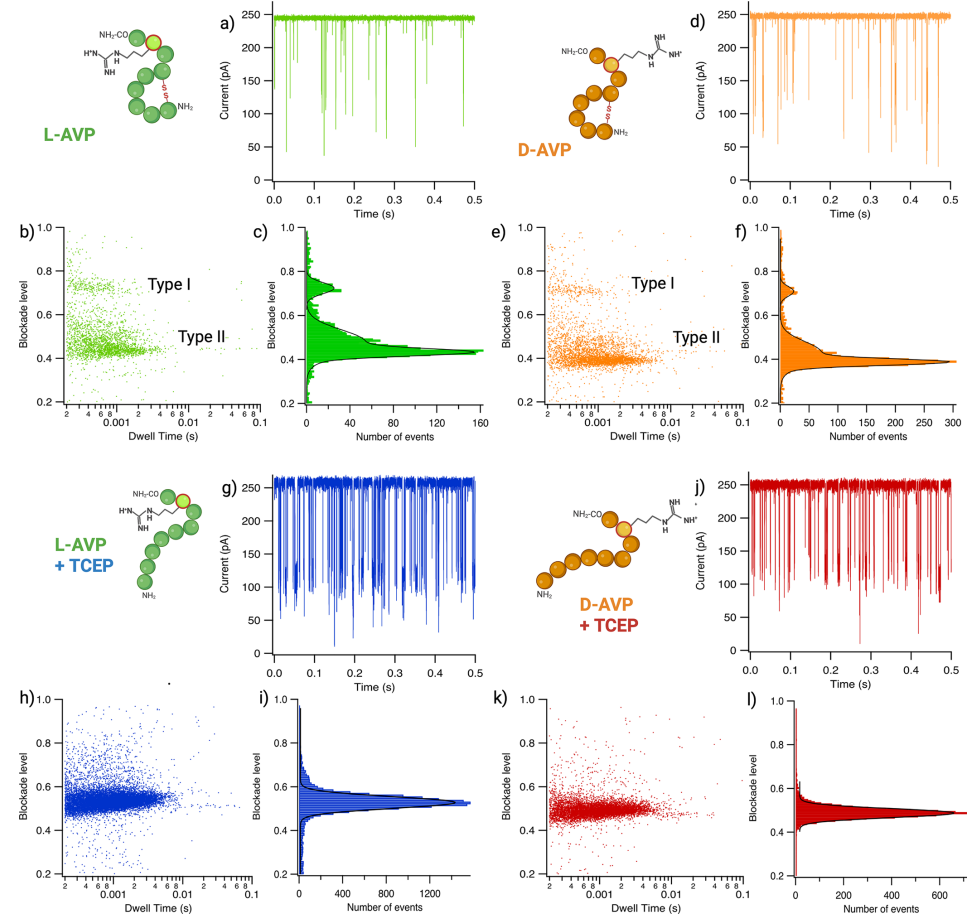
Ratinho, L. et al. ACS Cent Sci. 2024.
Figure 2. Analysis of L-AVP and D-AVP Peptide Enantiomers Using Nanopore Technology
2. Peptide Sequencing Based on Host-Guest Interaction-Assisted Nanopore Sensing
This study introduces a novel peptide sequencing method that combines enzymatic cleavage with host–guest interaction-assisted nanopore sensing. Using α-hemolysin nanopores in the presence of cucurbit[7]uril, the study identifies amino acids in phenylalanine-containing peptides through current blockage patterns. A proof-of-concept approach is demonstrated, where carboxypeptidases sequentially cleave amino acids from the peptide's C-terminus, and nanopore sensing is employed to determine their identities and sequence. This method offers a new direction for nanopore-based protein sequencing, with potential for further optimization to enhance sensitivity and accuracy. Peptide analysis service utilizes advanced nanopore technology combined with innovative experimental design to provide precise support for peptide sequencing and characterization, meeting diverse research needs for complex samples.
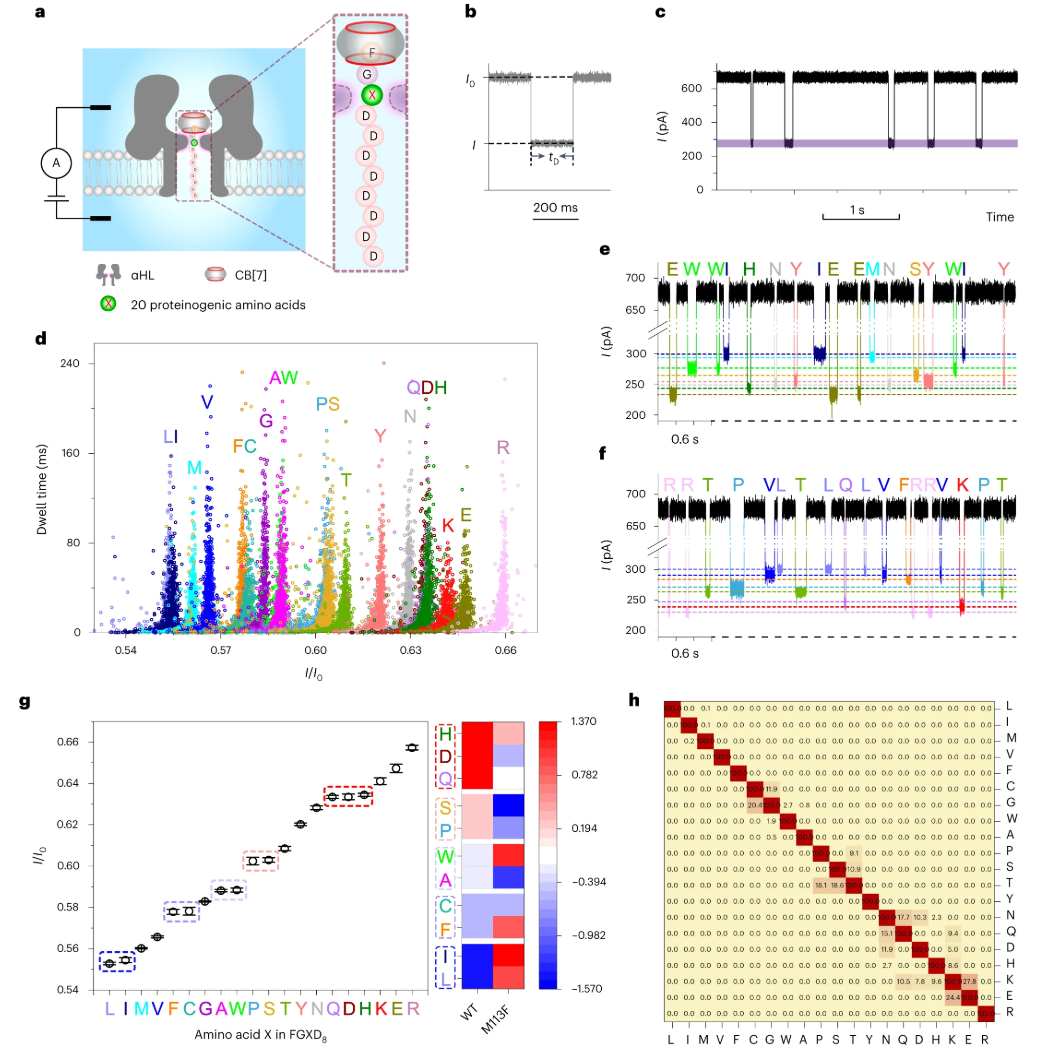
Zhang, Y. et al. Nat Methods. 2024.
Figure 3. Identification of the 20 Proteinogenic Amino Acids Using the FGXD8 Probe
Applications
1. Peptide Analysis in Tumor Therapy
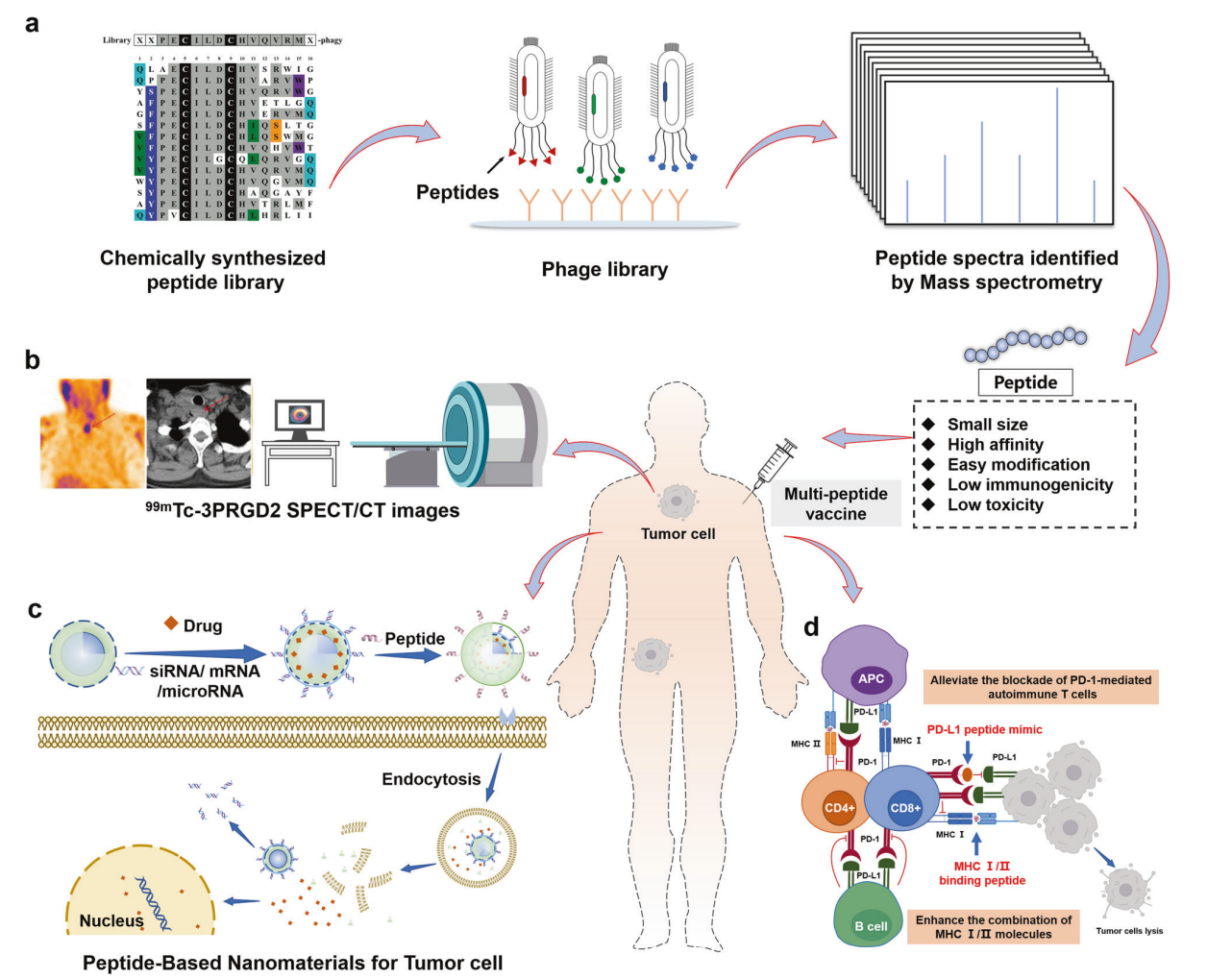
Wang, L. et al. Signal Transduct Target Ther. 2022.
Figure 4. Peptide Analysis in Tumor Therapy
2. Peptide Analysis in Biopharmaceutical Development
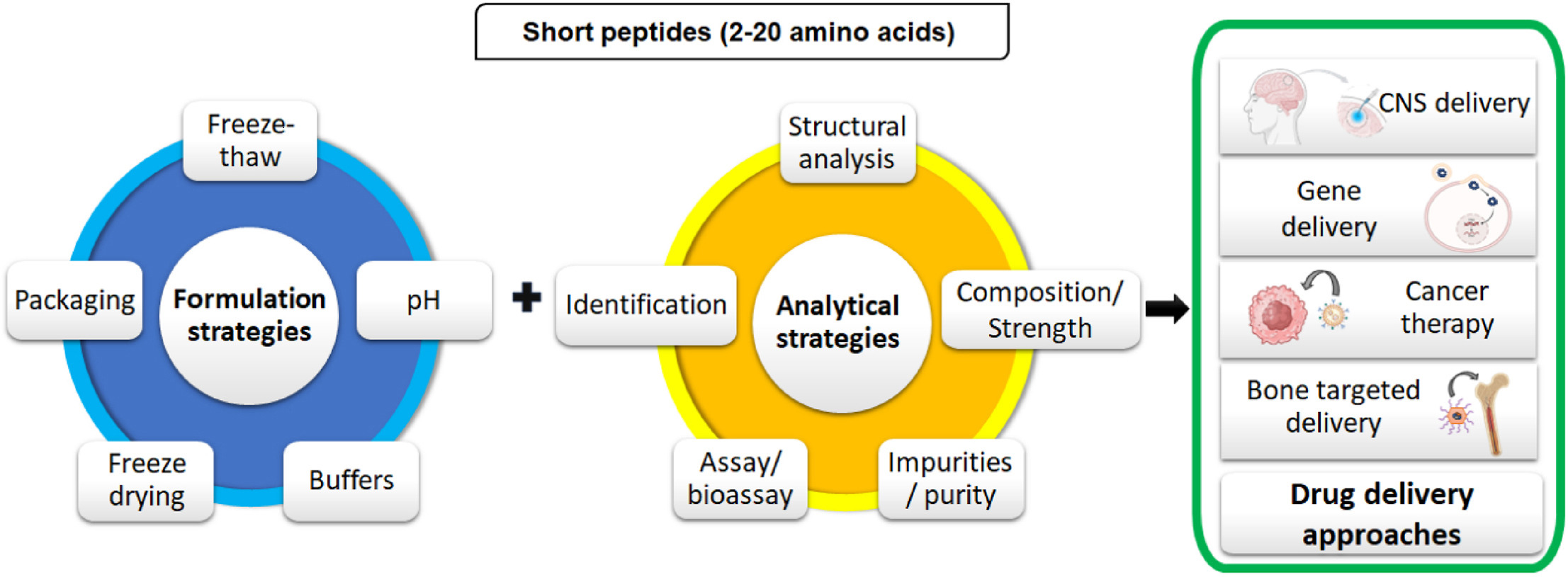
Chawathe, A. et al. Anal Biochem. 2025.
Figure 5. Peptide Analysis in Biopharmaceutical Development
Deliverables
1. Comprehensive Experimental Details
2. Materials, Instruments, and Methods
3. Relevant Liquid Chromatography and Mass Spectrometry Parameters
4. The Detailed Information of Peptide Analysis
5. Mass Spectrometry Image
6. Raw Data
MtoZ Biolabs, an integrated chromatography and mass spectrometry (MS) services provider.
Related Services
How to order?







